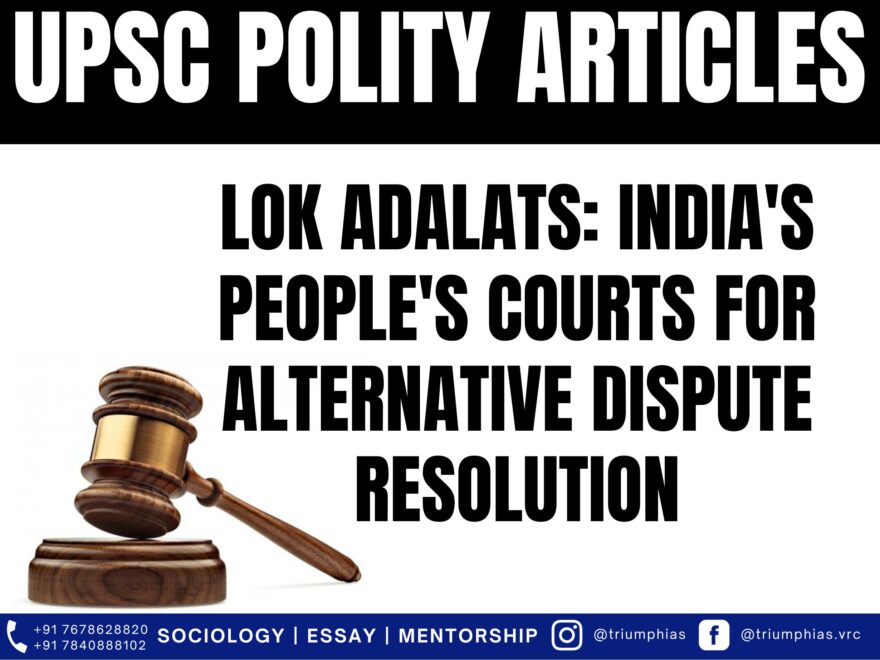Lok Adalat
(Relevant for Polity Section of General Studies Paper Prelims/Mains)

Lok Adalat
The term ‘Lok Adalat,’ signifying ‘People’s Court,’ is rooted in Gandhi an principles. According to the Supreme Court, it represents an age-old method of dispute resolution that existed in ancient India and continues to hold validity even in modern times. Moreover, it constitutes one of the integral components of the Alternative Dispute Resolution (ADR) system, offering an informal, cost-effective, and expeditious means of delivering justice to the general populace.
Recognizing its increasing popularity, the Legal Services Authorities Act of 1987 conferred statutory status upon Lok Adalats. This Act governs the establishment and operation of Lok Adalats.
Given the substantial backlog of cases in the Supreme Court of India, which currently stands at 71,411, Lok Adalats can significantly contribute to alleviating the burden on the judicial system, thereby aiding in its decongestion.
Organization of Lok Adalat:
- The State/District Legal Services Authority or the Supreme Court/High Court/Taluk Legal Services Committee has the authority to arrange Lok Adalats at appropriate intervals and locations, exercising jurisdiction over specified areas as deemed suitable.
- Each Lok Adalat convened for a particular area should comprise the number of serving or retired judicial officers and other individuals from that area as designated by the organizing agency.
- Typically, a Lok Adalat is constituted with a judicial officer serving as the chairperson, accompanied by a lawyer (advocate) and a social worker who serve as members.
- Lok Adalats are conducted by the National Legal Services Authority (NALSA) in collaboration with other Legal Services Institutions.
Benefits of Lok Adalat’s
- Cost-effective: There are no court fees involved, and any previously paid fees are refunded if the dispute is resolved in Lok Adalat.
- Flexible Procedures: Lok Adalats offer procedural flexibility and expedited resolution of disputes. They do not strictly adhere to procedural laws when assessing claims.
- Direct Interaction: Parties involved in the dispute can directly engage with the judge through their legal representatives, a privilege not available in regular courts.
- Binding and Final Award: The awards issued by Lok Adalats carry the status of a civil court decree and are legally binding. They are non-appealable, which expedites the dispute resolution process.
- Promotion of Cordial Relationships: Lok Adalats primarily aim for compromises between parties. During proceedings, Lok Adalats act as conciliators rather than arbitrators. Their role is to encourage parties to find a mutually agreeable solution and facilitate the resolution of their disagreements.
- This approach promotes consensus and not only leads to dispute settlement but also maintains amicable relationships between the parties. Consequently, Lok Adalats offer a healthy method of resolving disputes.
Lok Adalats can be functional at larger levels if people are willing and aware of its advantages. Further, more provisions and innovative utilization is needed that could empower permanent Lok Adalats and are made supplementary form of litigation for people who cannot or should not resort to courts.
Sample Question for UPSC Sociology Optional Paper:
-
Question: What is the historical basis of Lok Adalats in India?
Answer: Lok Adalats have roots in Gandhian principles and represent an age-old method of dispute resolution in ancient India that continues to be relevant today. - Question: What legal status has been conferred upon Lok Adalats?
Answer: The Legal Services Authorities Act of 1987 conferred statutory status upon Lok Adalats, governing their establishment and operation. - Question: What are some key benefits of using Lok Adalats for dispute resolution?
Answer: Lok Adalats offer a cost-effective, expedited, and informal means of resolving disputes, with the awards being legally binding and non-appealable. - Question: How are Lok Adalats organized?
Answer: Lok Adalats are organized by the State/District Legal Services Authority or the Supreme Court/High Court/Taluk Legal Services Committee. They typically comprise a judicial officer, a lawyer, and a social worker. -
Question: How do Lok Adalats differ from regular courts in terms of procedural flexibility?
Answer: Unlike regular courts, Lok Adalats do not strictly adhere to procedural laws, allowing for more flexible and expedited dispute resolution.
To master these intricacies and fare well in the Sociology Optional Syllabus, aspiring sociologists might benefit from guidance by the Best Sociology Optional Teacher and participation in the Best Sociology Optional Coaching. These avenues provide comprehensive assistance, ensuring a solid understanding of sociology’s diverse methodologies and techniques.
Lok Adalat, People’s Court, Alternative Dispute Resolution, ADR, Legal Services Authorities Act, Supreme Court of India, National Legal Services Authority, NALSA, Judicial System, Dispute Resolution, Civil Court Decree, Gandhian Principles
Choose The Best Sociology Optional Teacher for IAS Preparation?
At the beginning of the journey for Civil Services Examination preparation, many students face a pivotal decision – selecting their optional subject. Questions such as “which optional subject is the best?” and “which optional subject is the most scoring?” frequently come to mind. Choosing the right optional subject, like choosing the best sociology optional teacher, is a subjective yet vital step that requires a thoughtful decision based on facts. A misstep in this crucial decision can indeed prove disastrous.
Ever since the exam pattern was revamped in 2013, the UPSC has eliminated the need for a second optional subject. Now, candidates have to choose only one optional subject for the UPSC Mains, which has two papers of 250 marks each. One of the compelling choices for many has been the sociology optional. However, it’s strongly advised to decide on your optional subject for mains well ahead of time to get sufficient time to complete the syllabus. After all, most students score similarly in General Studies Papers; it’s the score in the optional subject & essay that contributes significantly to the final selection.
“A sound strategy does not rely solely on the popular
Opinion of toppers or famous YouTubers cum teachers.”
It requires understanding one’s ability, interest, and the relevance of the subject, not just for the exam but also for life in general. Hence, when selecting the best sociology teacher, one must consider the usefulness of sociology optional coaching in General Studies, Essay, and Personality Test.
The choice of the optional subject should be based on objective criteria, such as the nature, scope, and size of the syllabus, uniformity and stability in the question pattern, relevance of the syllabic content in daily life in society, and the availability of study material and guidance. For example, choosing the best sociology optional coaching can ensure access to top-quality study materials and experienced teachers. Always remember, the approach of the UPSC optional subject differs from your academic studies of subjects. Therefore, before settling for sociology optional, you need to analyze the syllabus, previous years’ pattern, subject requirements (be it ideal, visionary, numerical, conceptual theoretical), and your comfort level with the subject.
This decision marks a critical point in your UPSC – CSE journey, potentially determining your success in a career in IAS/Civil Services. Therefore, it’s crucial to choose wisely, whether it’s the optional subject or the best sociology optional teacher. Always base your decision on accurate facts, and never let your emotional biases guide your choices. After all, the search for the best sociology optional coaching is about finding the perfect fit for your unique academic needs and aspirations.
To master these intricacies and fare well in the Sociology Optional Syllabus, aspiring sociologists might benefit from guidance by the Best Sociology Optional Teacher and participation in the Best Sociology Optional Coaching. These avenues provide comprehensive assistance, ensuring a solid understanding of sociology’s diverse methodologies and techniques. Sociology, Social theory, Best Sociology Optional Teacher, Best Sociology Optional Coaching, Sociology Optional Syllabus.
Best Sociology Optional Teacher, Sociology Syllabus, Sociology Optional, Sociology Optional Coaching, Best Sociology Optional Coaching, Best Sociology Teacher, Sociology Course, Sociology Teacher, Sociology Foundation, Sociology Foundation Course, Sociology Optional UPSC, Sociology for IAS,
Follow us :
🔎 https://www.instagram.com/triumphias
🔎https://www.youtube.com/c/TriumphIAS
https://t.me/VikashRanjanSociology
Find More Blogs
|
Scope of the subject and comparison with other social sciences |
|||
|
|
|
|
Modernity and social changes in Europe |

